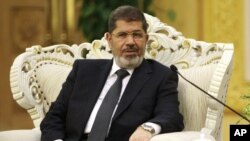CAIRO —
With his mediation in the Israeli Gaza aerial conflict, Egyptian President Mohamed Morsi has faced a high profile test of his presidency.
Egypt's first Islamist president has been carrying out a delicate balancing act, showing solidarity with the Muslim Brotherhood's religious and political offspring, the Hamas leaders of Gaza, while portraying himself as a reliable broker for Israel and the West.
In the five months since his election, Morsi has tried to present a reinvigorated Egypt to the world, traveling around the region and as far afield as China and the United States.
Now, the world has come to Cairo, with officials from the United Nations, United States and other nations supporting Egyptian mediation efforts in the Israel-Gaza crisis.
The muscular approach stands in contrast to the waning years of the former Egyptian government of Hosni Mubarak, who kept up Egypt's peace treaty with Israel, questioning little as the nation received billions in U.S. aid.
Mustafa el Labbad is the director of al Sharq Center for Regional and Strategic Studies.
"Egypt stagnated in the last three decades so much that Egypt was not in a position to negotiate any other matter outside its border. Egypt has its own economic problems and it would be false to think that Egypt is going to have immediately the leadership in the Arab world. But Egypt turned its back to Mubarak's policies and now is heading for active mediation," he said.
Morsi faces a more outspoken populace, even as he, too, counts on Western aid and investment to help the nation through its economic crisis.
Protests in support of Gaza broke out across Egypt in the days after the conflict escalated, refueling resentment against Israel.
Yet the reflexive anti-Zionist sentiment throughout the country is countered by practical concerns. Few here want an influx of poor, often militant Palestinians across Gaza's border into Egypt's Sinai, already struggling with a surge in lawlessness and extremism.
It's a cold reality that has allowed Morsi to work well with both sides.
Al Sharq Center's el Labbad believes Israel also has an interest in cultivating Morsi, or rather, the group from which he rose, as the wave of the future.
"The strategic atmosphere and environment around Israel is shifting. You have Hamas on its border, you have Egypt under the Muslim Brotherhood, you have an active Muslim Brotherhood in Jordan and one of the alternatives for Bashar al-Assad in Syria also would be the Muslim Brotherhood," he said.
In a twist, the Islamist leader has proved, in public, to be more moderate than another power player in the region, the leader of secular Turkey, Prime Minister Recep Tayyip Erdogan.
The Turkish leader this week called Israel “a terrorist state,” effectively shutting himself out of any role as a mediator.
Political observers have long touted the “Turkish model” of regional political and economic leadership as one for Egypt to emulate. But author Hassan Naffae, of Cairo University, says Egypt's new rulers are not likely to agree.
"The Turkish model, even if its perceived as a good one - I am not quite sure if the Islamists are seeing it that way," he said.
In the meantime, Morsi is forging his own path of apparent moderation. It's a position welcomed by many Egyptian intellectuals, even as they question how long it will last.











